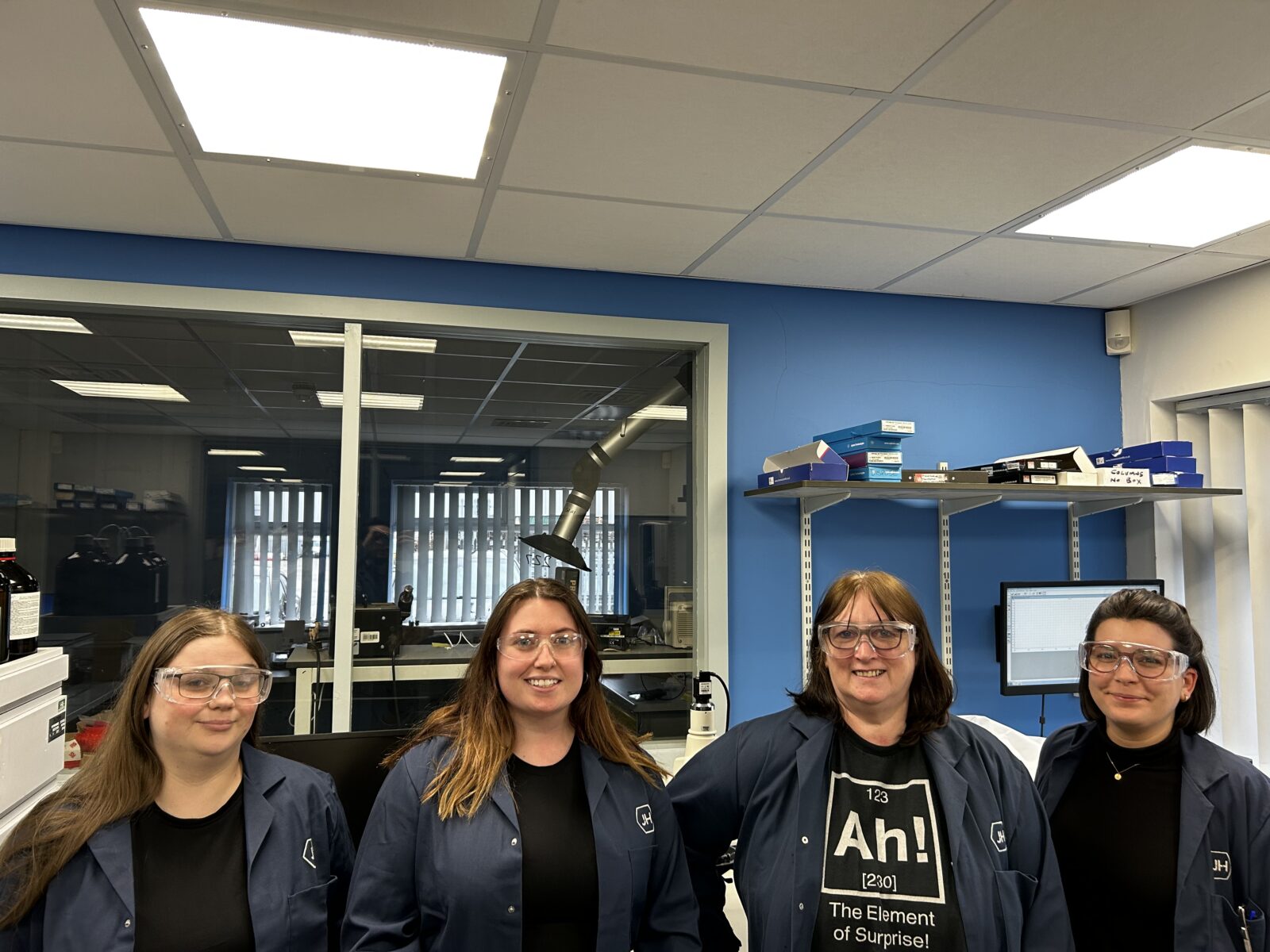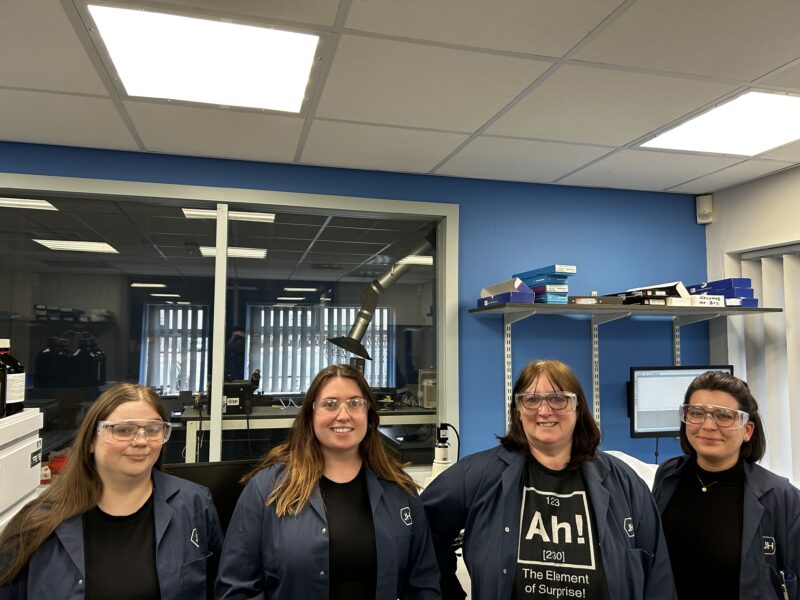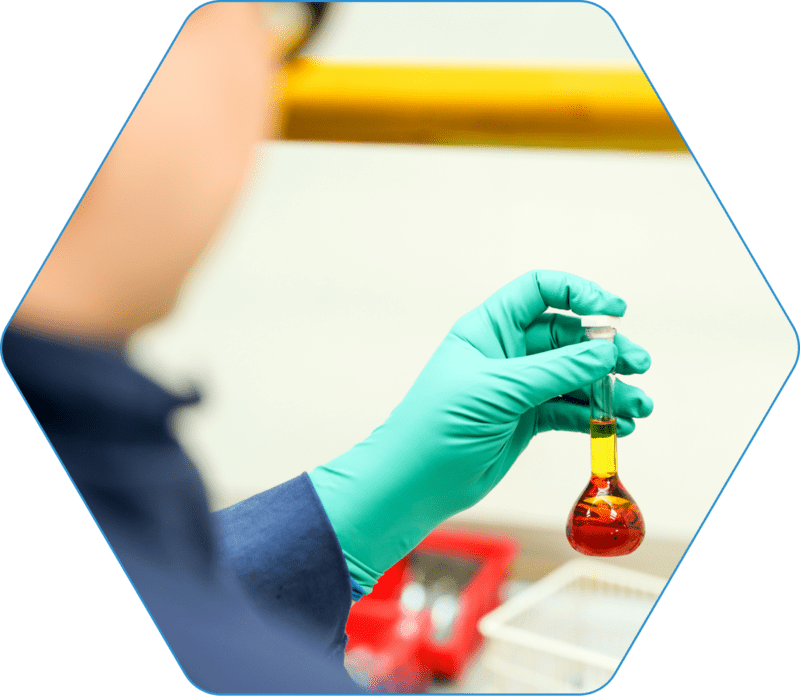
International WEEK of Women and Girls in Science – Lauren & Gill
ShareJohn Hogg has always prioritised people over products. It’s in our DNA! And as a company with chemistry at its heart, we believe in the importance of equality and inclusion in scientific fields. So, to celebrate the International Day of Women and Girls in Science, we are highlighting the stories of how four members of our technical team, Lauren and Gill, Lucile, and Kat, forged their careers in science, and some of the challenges they faced along the way.
 Women and girls in Science: where does the lack of representation STEM from?
Women and girls in Science: where does the lack of representation STEM from?
According to the United Nations (UN), most countries in the world have not achieved gender equality in STEM (Science, Technology, Engineering and Mathematics). In fact, there are still serious problems the world over in making sure that women and girls are given the same opportunities and access to science.
‘Women in Tech’ found that In the UK, just over 25% of the STEM workforce is female, despite the efforts made by science and technology companies to improve diversity. A far lower number of girls are studying STEM subjects beyond their GCSE’s (35%) compared with boys (80%), and even less graduates with a degree. This is even though the levels of interest in science between girls and boys aged 14-18 are very similar, according to the British Science Association.
But why are so many women and girls choosing other career paths than Science, and how can we encourage the younger generation of girls to get involved in scientific careers?
Lauren joined John Hogg in 2023, as a QC and Technical Service analyst. And, although she ended up working in science eventually, it was far from a vocation when she was younger.
“I guess I kind of fell into science during college”, Lauren said. “I decided to do English and Maths, with Chemistry as my third choice. It was a challenging few years of studying, but one thing I always enjoyed about Chemistry is that no matter if you succeed or fail, you always learn something.”
She then decided to continue her studies in chemistry at university, initially in forensic chemistry, before moving onto the more general chemistry course at Manchester Metropolitan University.
“It wasn’t until I got to university where I really started to love Chemistry. I especially enjoyed the quantum mechanics modules; I think because it was so difficult, and it pushed me to want to learn more about the subject.”
“I also had some brilliant teachers at university, especially the female lecturers. I never really had a female role model in science when growing up, so seeing how passionate the lecturers were about science, really inspired me and helped me to enjoy my studies.”
The lack of female role models for young girls has been cited as one reason that so many girls do not pursue careers in science. In fact, research from CW Jobs found that three-quarters (74%) of younger people without a role model have yet to decide upon a career direction. There were other stumbling blocks early on that could have stopped Lauren before she had even started to consider her career or degree at all.
“I think an obvious barrier of getting into physical sciences earlier, was the lack of interest that my primary & secondary schools showed in promoting the subject, and even a lack of engaging teachers. I also felt that physical sciences were not pushed as much as Maths & English were, even though they are core subjects. I didn’t even know what engineering was, until the latter end of secondary school…”
Lauren is just as passionate as we are about getting the younger generation interested and involved in science, so we asked her for one piece of advice that she would give them.
 “Be open to trying new things. Chemistry for me has been one of the many things that I love doing, after never thinking I would. Forget what others think about something and find your own path from your interests. There is a place in science for so much out there!”
“Be open to trying new things. Chemistry for me has been one of the many things that I love doing, after never thinking I would. Forget what others think about something and find your own path from your interests. There is a place in science for so much out there!”
Speaking from Experience
Another member of our technical team, Gill, also faced challenges in starting her career in science throughout her childhood and teenage years. And, although these were a slightly different set of challenges to Lauren’s, the same issues still affected her journey in the same way. Gill joined John Hogg in 2008, as part of a successful career in QC. And, in a similar way to Lauren, Gill wasn’t exactly encouraged into a scientific field at a young age.
“When I was in high school in the late 70’s, a lot of women were taking up typing. Even my mum was pushing me down that route as she was brought up in an office environment. I didn’t like those ‘mundane’ subjects, I wanted to do science!” Gill said. “Luckily, the deputy head mistress at the time not only saw how interested I was in the subjects, but how good I was at them too. It took her to convince my parents that I should go down that path, and from then on, I think my mum was on board with the whole idea.”
“You could say that the deputy headmistress was a role model for me in science, she believed in me. But I also had some really great teachers in school, the ones that would make the classes enjoyable because of how funny they were. A good teacher can really make you enjoy a subject.“
After graduating high school, Gill secured a job as a check weigher in a factory, following a successful apprenticeship. This was the first time that she experienced being ‘glossed over’ for being a female in a company.
“A job came up in the lab, which is something that I really wanted to do. When I put the application in to the Managing Director, I was told that they don’t have women working in the labs. Of course, this disheartened me, so I told my Production Manager. He was a lovely man, and he told the Managing Director that if he didn’t put me in the lab, he would take him to the tribunal himself. Within 3 months I was working in the lab, being the first woman in the company to do so. After a short while, there were loads of us. I truly appreciate what my production manager did at the time, he was a great role model.”
Gill’s story reiterates the importance of role models, support and encouragement for getting women and girls into STEM roles. The research from CW Jobs claims there is a distinct lack of recognition around notable women in science. When individuals were asked if they could recommend a current female role model, only one in ten of all respondents could identify any women that they would put forward to help inspire the next generation. Most women (91%) in the study, thought more should be done to promote female role models in STEM fields.
Gill also has some words of encouragement for girls who may be thinking about STEM as their career path, “What I would say is if you have an interest in something, absolutely go for it. Speaking from my personal experience, people believed in me, because of the interest that I showed. Now, I can see this transition with new starters at John Hogg, I feel like a mother to some of these women. You really stand out when you show a passion in what you want to do. It’s great to see so many women applying for jobs here!”
So, what is the International Day of Women and Girls in Science all about?
 The International Day of Women and Girls in Science, celebrated annually on February 11th, was set up by the UN to tackle one of the greatest challenges of the Agenda for Sustainable Development. The day aims to promote full and equal access to science for women and girls, while also addressing the gender disparities prevalent in Science, Technology, Engineering and Mathematics (STEM) fields.
The International Day of Women and Girls in Science, celebrated annually on February 11th, was set up by the UN to tackle one of the greatest challenges of the Agenda for Sustainable Development. The day aims to promote full and equal access to science for women and girls, while also addressing the gender disparities prevalent in Science, Technology, Engineering and Mathematics (STEM) fields.
Gender equality has always been a core issue for the United Nations. Gender equality and the empowerment of women and girls will make a crucial contribution not only to economic development of the world, but to progress across all the goals and targets of the 2030 Agenda for Sustainable Development, as well.
John Hogg are proud to support the work being done by the UN to tackle gender equality issues in STEM fields.



